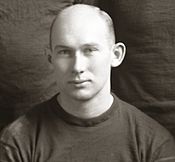List of Michigan Wolverines head football coaches
Since then, nine other coaches have led the Wolverines to postseason bowl games: Fritz Crisler, Bennie Oosterbaan, Bump Elliott, Bo Schembechler, Gary Moeller, Lloyd Carr, Rich Rodriguez, Brady Hoke, and Jim Harbaugh.
Ten coaches have won at least one of Michigan's 44 Big Ten Conference championships: Gustave Ferbert, Yost, Harry Kipke, Crisler, Oosterbaan, Elliott, Schembechler, Moeller, Carr, and Harbaugh.
Four coaches—Kipke, Oosterbaan, Elliott and Harbaugh—have won Big Ten titles as both a player and as the head coach for Michigan, and Moeller won titles as a player for Ohio State and as head coach for Michigan.
Yost, Kipke, Crisler, Oosterbaan, Carr and Harbaugh have also won national championships with the Wolverines.
Michigan had nine head coaches between 1900 and 1989, each of whom has been inducted into the College Football Hall of Fame either as a coach or as a player: Langdon Lea, Yost, George Little, Tad Wieman, Kipke, Crisler, Oosterbaan, Elliott, and Schembechler.
While official sources list only Mike Murphy and Frank Crawford as the coaches of the 1891 team,[7] the Chicago Daily Tribune reported in November 1891 that the Michigan team was "coached systematically" by Murphy, Crawford, Horace Greely Prettyman and James Duffy.
[13] The 1895 team compiled an 8–1 record, won seven of their games by shutouts, and outscored their opponents by a combined score of 266 to 14.
[17] The 1898 team coached by Ferbert finished with a perfect 10–0 record and won Michigan's first Western Conference championship.
They are Lea,[24] Fielding "Hurry Up" Yost,[25] George Little,[26] Tad Wieman,[27] Harry Kipke,[28] Fritz Crisler,[29] Bennie Oosterbaan,[30] Bump Elliott,[31] and Bo Schembechler.
[32] With the departure of Ferbert, Michigan hired three-time Princeton All-American "Biffy" Lea to coach the 1900 team.
[33][34] Fielding H. Yost has the longest tenure among Michigan head coaches, holding the position for 25 seasons from 1901–1923 and 1925–1926.
In his first year as head coach, the Wolverines finished in an eighth place tie in the Big Ten with a 5–3–1 record.
However, Kipke quickly turned things around, leading the Wolverines to four straight conference championships and two national titles between 1930 and 1933.
"[40] In 1934, Kipke’s Wolverines fell from national champions to a tenth-place finish in the conference with a 1–7 record.
[42] Crisler is best known as "the father of two-platoon football,"[43] an innovation in which separate units of players were used for offense and defense.
[46] Crisler retired as head coach after the 1947 season to become the school's full-time athletic director.
As recently as 2003, Oosterbaan was selected by Sports Illustrated as the fourth greatest athlete in the history of the State of Michigan.
Elliott had played halfback for Fritz Crisler's Michigan teams in 1946 and 1947 and won the Chicago Tribune Silver Football trophy as the Most Valuable Player in the conference in 1947.
He later served as the athletic director at the University of Iowa from 1970 to 1991, hiring such coaches as Dan Gable, Hayden Fry, Lute Olson, C. Vivian Stringer, and Dr. Tom Davis.
During his five seasons as head coach (1990–1994), the Wolverines had a record of 44–13–3 and won or shared conference titles in 1990, 1991 and 1992.
[52] Moeller resigned in May 1995 after tapes were released of his alleged drunken outburst following an arrest on a charge of disorderly conduct at a restaurant in Southfield, Michigan.
Under Carr, the Wolverines compiled a record of 122–40 and won or shared five Big Ten Conference titles (1997, 1998, 2000, 2003, and 2004).
Prior to joining Michigan, Rodriguez was the head coach at West Virginia University for seven years.
In his three seasons as Michigan's head coach, Rodriguez compiled a record of 15–22, including a mark of 6–18 in Big Ten Conference games.
His winning percentage of .405 overall and .250 in Big Ten play are the lowest among all 19 individuals to serve as Michigan's head football coach.
In his first season as Michigan's head football coach, Hoke compiled a record of 11–2, as Michigan finished 6–2 in conference and second place in the newly formed Big Ten Legends Division and then won the Sugar Bowl.
[57] On December 30, 2014, Jim Harbaugh was hired as the head football coach at the University of Michigan.
In 2021, Harbaugh led Michigan to a victory over Ohio State and the program's first Big Ten championship in 17 years.
[63][64][65][66][67][68][69][70] On January 26, 2024, Michigan named Sherrone Moore as its head coach following Harbaugh's departure to the Los Angeles Chargers.







